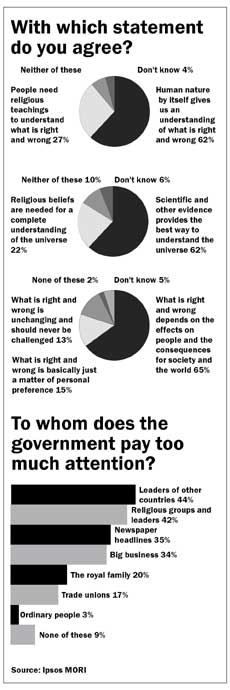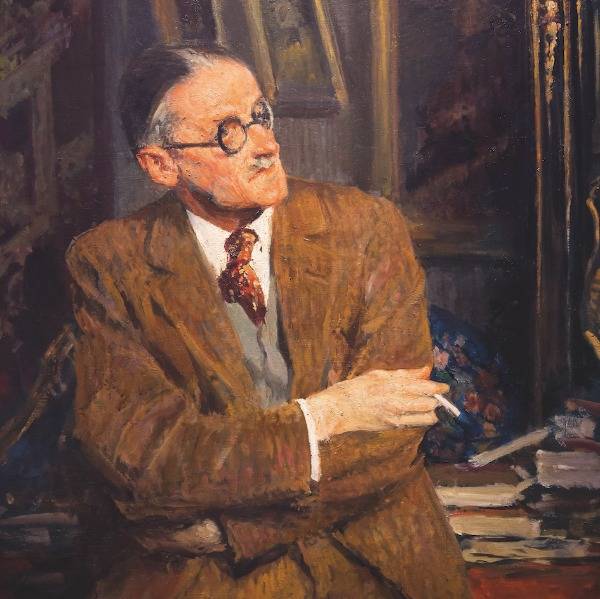Human nature by itself gives us an understanding of what is right and wrong, according to 62 per cent of respondents to a MORI survey commissioned by the British Humanist Association (BHA).
A similar percentage of the 975 people who responded believes that morality is a human rather than a spiritual value and that scientific evidence is the best way to understand the universe.
 And yet there is a persistent perception that Britain is a fundamentally religious country. And it’s an assumption that seems to lend increasing prominence to the views and proclamations of religious leaders and commentators.
And yet there is a persistent perception that Britain is a fundamentally religious country. And it’s an assumption that seems to lend increasing prominence to the views and proclamations of religious leaders and commentators.
Part of the reason is found in the 2001 census. The fact that 70 per cent of respondents had ticked the “Christian” box, once it was known, gave the proponents of the “Christian country” case the biggest boost they have had for a century.
It is used against humanists regularly – at meetings with government, in the media, and in public events and debates across the country – to refute any claim of legitimacy and public support for our cause.
Point out that attendance at Christian places of worship is only 7 per cent of the population or that 68 per cent of marriages are not religious, and religious campaigners will retort that in spite of this, there is a values-based, unconscious Christianity which really drives people. People “believe”, even if they don’t “belong”.
Their values ultimately come from a religious source; their understanding of the universe and their meaning and purpose within it are still indebted to a Christian tradition which suffuses our national life.
Even the 15 per cent who ticked the “no religion” box couldn’t mean it, according to this argument, and they certainly couldn’t be claimed as humanists specifically. As for the majority, well, they ticked the “Christian” box, didn’t they? So all this must be even truer of them.
The more often religious representatives (and especially representatives of the Church of England) attack the open and secular model of society, the more urgent it is for humanists to muster strong and convincing evidence to counter their prejudices and to demonstrate that those who are not religious are largely also humanists.
That is why the results of this poll are so welcome. It cannot claim to be comprehensive, but it does provide ammunition against the advocates of both the “Christian country” model and the equally exclusive “multi-faith” model of British society.
Three questions in the poll asked respondents to choose between two or three statements, one of which in each case represented the humanist position on a basic question.
Two of the questions dealt with morality – an arena that the “Christian country” party claims as its own. “British society is based on a Christian vision and Christian values – its institutions, its laws, its customs – all of these arise out of a Christian vision... unless people know what the springs are that feed our values the whole thing will dry up,” claims the Bishop of Rochester, while the Archbishop of York inveighs against “the slow chipping away at the foundational heritage that gave birth to those values we all share.”
In contrast, 62 per cent of respondents in the MORI poll chose the statement “Human nature by itself gives us an understanding of what is right and wrong” against 27 per cent who chose “People need religious teachings in order to understand what is right and wrong.”
Faced with three further choices, 65 per cent said that what is right and wrong “depends on the effects on people and the consequences for society and the world”, 15 per cent said right and wrong were “basically just a matter of personal preference” and 13 per cent said what was right and wrong was “unchanging and should never be challenged”.
In short, a majority of respondents located the origins of morality not in religious doctrine but in human impulses, and a majority said they constructed their morality not from fixed doctrine (nor are they moral relativists) but on the solid ground of the actual effects of our actions on others.
Similarly, a majority of 62 per cent of respondents said that “scientific and other evidence provides the best way to understand the universe” against only 22 per cent who felt “religious beliefs are needed for a complete understanding of the universe”.
Some critics of the MORI data have pointed out that the results are not an accurate indication of whether the respondents are humanist, because similar responses might well be returned by people identifying themselves as religious.
But that is precisely something that the poll aimed to demonstrate: that whether or not people describe themselves as religious, the majority of people actually construct their morality around the drive for human welfare rather than the imperatives of a religious code.
If you believe that morality is derived from human impulses, not from an external giver of the law, then that surely is a workable definition of humanism.
On the basis of the fact that 36 per cent of respondents returned “humanist” answers to all three questions, MORI has given a figure of 17 million such people in Britain today. Why, then, are religious representatives allowed to get away with their expansive claims about the religious nature of society?
Part of the reason must rest with the attitude of the media. This MORI poll received next to no coverage in the secular media (though it was reported on and covered by all the religious press). And yet there is always a relentless stream of stories supporting the “Christian country” perspective.
Maybe this is because, as the poll suggests, Britain really is a post-religious society – to such an extent that to report its findings would merely be to state the obvious. The counter-claims and hyperbole of the religious lobby can be treated as exotic pieces and newsworthy. The fact that we’re now a secular society is simply not news.
But we shouldn’t become too complacent. In the face of an increasingly shrill and forceful religious push against the open and secular society, the values of humanism need articulating and promoting. Those who find that their worldview is a humanist one need to recognise it and defend it.
A final question in the poll asked respondents to select up to three groups from a list of seven to which they thought the government pays too much attention. More people chose “religious groups and leaders” than chose any other domestic group; in fact, “religious groups and leaders” came second only to “leaders of other countries” in these results.
If we want the government to pay attention to non-religious voices, then we have to raise our own. There’s no time to lose. ■

